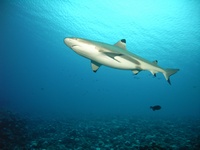
Dear fellow divers I have never written a blog before but I am willing to give it a shot in hopes to get some of you motivated to help the oceans. Ever since I was a child I found the ocean to be an amazing, mysterious place. Growing up in the Jaws error I feared sharks like everyone else who went to see Peter Benchley’s masterpiece on the big screen. I didn’t start diving until years later when I was able to overcome my fear of sharks. Now I love to see them. Unfortunately, that fear still keeps many people from exploring beneath the waves into a world that we have come to call our playground. We as divers have a unique respect for the oceans because we know there is a lot more to what we see on the surface. That is why I believe that it is incumbent upon us as divers to also be good ocean stewards and educate our non diving friends at every opportunity. The oceans have been abused and taken for granted for so long that scientists are now realizing how much damage has been done to our fisheries from overfishing, loss of habitat from bottom trawl fishing, construction, and other destructive human activities, introduction of invasive species, and various types of pollution. For so many years and still to this day there are people who believe the oceans are vast and limitless. For as many years we had contributed to the decline of the same oceans to a point where drastic measures need to be taken. In 2003 the PEW Oceans report came out and shortly therafter, the U.S. Commission On Ocean Policy report was released. Both of these reports, independent of one another, outlined ocean problems within our countries boundries and recommended changes in government to improve the quality of our oceans. It was a step in the right direction, but there is so much more that needs to be done. Take for instance our fisheries. According to the Pew report, “Currently, we know of 93 U.S. fish populations that are already overfished or that are currently being fished at unsustainable rates – nearly a third of the 304 fish populations that scientists have assessed (NMFS, 2002b). The majority of the already overfished populations are still being fished unsustainably, frustrating rebuilding efforts. The status of another 655 populations, including 120 major stocks (those with landings of at least 200,000 pounds of fish a year) is unknown and new assessments are expected to show even more overfished populations in need of rebuilding.” For many years the U.S. fishing fleet was pretty much self governed. Only those who live up in the New England states knew about the collapse of the Atlantic cod fishery many years ago. No one else really cared because there were so many other species of fish to choose from. Little by little and one by one many of those fisheries were fished beyond sustainability to a point now where aquaculture seems to be a viable alternative to sending boats out for the few fish that are left. Twenty five years ago, a 600+ pound swordfish was nothing to write home about. Today a big swordfish is in the 150 pound range and getting smaller. The problem is the same with other billfish and sharks as well. The commercial fishing boats are fishing beyond the fishes capabilities to reproduce. Many of these pelagic species don’t mature until late in their lives and they produce few young. There are a number of websites and organizations that I have done volunteer work for in order to get the word out to the general public. I believe this is important enough for us as divers to get involved in because we too have a vested interest in the oceans. I have listed some web sites that may be worth checking out in case you would like to know more about what is going on in the oceans we call our playground. www.oceanconservancy.org www.tampabaywatch.org www.mbayaq.org seafood watch www.pewtrusts.org In the end, we will conserve only what we love, we will love only what we understand and we will understand what we are taught. Bab Dioum, Senegalese Conservationist